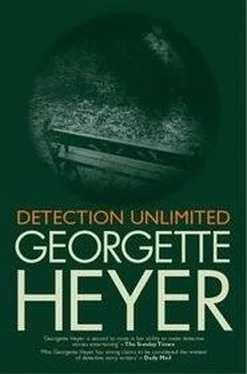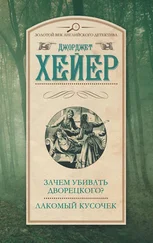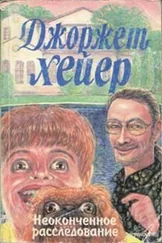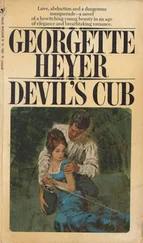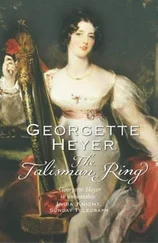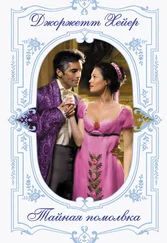Джорджетт Хейер - Detection Unlimited
Здесь есть возможность читать онлайн «Джорджетт Хейер - Detection Unlimited» весь текст электронной книги совершенно бесплатно (целиком полную версию без сокращений). В некоторых случаях можно слушать аудио, скачать через торрент в формате fb2 и присутствует краткое содержание. Год выпуска: 1953, Жанр: Детектив, на английском языке. Описание произведения, (предисловие) а так же отзывы посетителей доступны на портале библиотеки ЛибКат.
- Название:Detection Unlimited
- Автор:
- Жанр:
- Год:1953
- ISBN:нет данных
- Рейтинг книги:4 / 5. Голосов: 1
-
Избранное:Добавить в избранное
- Отзывы:
-
Ваша оценка:
- 80
- 1
- 2
- 3
- 4
- 5
Detection Unlimited: краткое содержание, описание и аннотация
Предлагаем к чтению аннотацию, описание, краткое содержание или предисловие (зависит от того, что написал сам автор книги «Detection Unlimited»). Если вы не нашли необходимую информацию о книге — напишите в комментариях, мы постараемся отыскать её.
Detection Unlimited — читать онлайн бесплатно полную книгу (весь текст) целиком
Ниже представлен текст книги, разбитый по страницам. Система сохранения места последней прочитанной страницы, позволяет с удобством читать онлайн бесплатно книгу «Detection Unlimited», без необходимости каждый раз заново искать на чём Вы остановились. Поставьте закладку, и сможете в любой момент перейти на страницу, на которой закончили чтение.
Интервал:
Закладка:
“Certainly not. I happen to know that Throckington & Flimby act for them. In point of fact, no solicitors were employed either by me or by them.”
“You didn't get your own solicitors to draw up the contract, sir?”
“Quite unnecessary! Sheer waste of money! Very respectable firm. They wouldn't cheat me, or I them.”
“Then, I daresay that would account for your solicitors not seeming to know you'd already disposed of the rights in the pit,” said Hemingway.
“If you mean Drybeck, he was perfectly well-aware that I had done so,” said the Squire, his eyes never shifting from the Chief Inspector's face.
“No, not him, sir. Some London firm. Belsay, Cockfield & Belsay I think their names are.”
A draught from the open door stirred the papers on the table. The Squire methodically tidied them, and set a weight on top of the pile. “Belsay, Cockfield & Belsay are the solicitors to the Trustees of the Settlement of the estate,” he said. “The details of any transactions of mine would naturally be unknown to them. Do I understand you to say that Warrenby had been in communication with them?”
“That's right, sir. And seeing that it seems to have been pretty inconclusive I thought I'd ask you for the rights of it.”
“May I know the gist of this correspondence?”
“Well, it seems Mr. Warrenby had a client who was interested in gravel, sir. He wrote to these solicitors, making enquiries about terms, having been informed—so he wrote—that they were the proper people to approach in the matter. Which they replied that they were, in a manner of speaking, but that any arrangements would have to be with you. And, as far as the documents go, there it seems to have petered out. For I gather he didn't approach you, did he, sir?”
It was not the Squire but Mrs. Ainstable who answered, exclaiming: “No, he approached me instead! Really, what an impossible person he was! It's no use frowning at me, Bernard: he may be dead, but that doesn't alter facts! So typical of him to find out from me that you'd already leased the gravel-pit, instead of asking you! I can't bear people who go about things in a tortuous way for no conceivable reason! So dreadfully underbred!”
“He asked you, did he, madam?”
“Oh, not in so many words! He led the conversation round to it.”
“When was that?” asked Hemingway.
“Heavens, I don't know! I'd forgotten all about it until you told us all this. He was the most inquisitive man—and quite unsnubbable!” She laughed, and stubbed out her cigarette. “I wonder who his client was? It sounds rather as if it must have been some shady firm he knew my husband wouldn't have had anything to do with. What fun!”
“No doubt that would have been it,” agreed the Chief Inspector, rising to his feet.
Chapter Eleven
It was five o'clock when Hemingway reached the Vicarage, and he found the vicar in conference with one of the Church wardens, Mr. Henry Haswell. An awed and inexperienced maidservant ushered him straightaway into the Vicar's study, saying with a gasp: “Please, sir, it's a gentleman from Scotland Yard!”
“Good gracious me!” ejaculated the Vicar, startled. “Well, you'd better show him in, Mary—oh, you are in! All right, Mary. That'll do! Good-afternoon—I don't know your name?”
Hemingway gave him his card, which he put on his spectacles to read. “Chief Inspector Hemingway: dear me, yes! You must tell me what I can do for you. Oh, this is one of our Church wardens—Mr. Haswell!”
“Perhaps you'd like me to clear out?” said Haswell, nodding briefly to the Chief Inspector.
“Not on my account, sir,” said Hemingway. “Very sorry to come interrupting you, Vicar. It's quite a small matter, really. I see by the Firearms Register that you own a .22 rifle. Could I have a look at it?”
“Rifle?” said the Vicar blankly. “Oh, yes, so I do! But it is really my son's. That is to say, I got it for him originally, though of course he has no use for it now he lives in London. Still, one never knows when he might like to have it, beside getting a little sport when he comes to visit us. I don't shoot myself.”
“No, sir. Might I see it?”
“Now let me think!” said the Vicar, looking harassed. “Dear me, this is very awkward! I wonder—? Excuse me, I'll go and look! Do take a chair!”
Hemingway watched him leave the room, and said, with a resigned sigh: “Yes, I can see this is another rifle which has been allowed to go astray. I think you were responsible for the first, sir.”
“Not unless you consider me responsible for my wife's—misdemeanours, Chief Inspector,” replied Haswell calmly. “Nor can I agree that the rifle in question has gone astray. It is true that it was lent—improperly, of course—to the local plumber, who once got my wife's car to start for her; but it is equally true that he returned it some days ago, since when it has not, to my knowledge, been out of the house.”
“Yes, that's all very well, sir,” retorted Hemingway, “but my information is that it was left hanging about in a cupboard in your cloakroom, so that as far as I can make out anybody could have borrowed it without you being the wiser!”
“Quite so, but may I point out that it was found in that cupboard no later than yesterday evening? While I can—with some difficulty—visualise the possibility of its having been abstracted by one of the people who came to my wife's tennis-party, I am quite unable to arrive at any satisfactory explanation of how anyone knew that there was a rifle at the back of a coat-cupboard, or how he or she could have restored it without having been seen by any member of my household. Have you collected the rifle? My son left it ready for you.”
“No, I didn't, sir, but Sergeant Carsethorn did, which is how I come to know what happened to it.”
Haswell smiled faintly. “You must admit we've kept nothing from you, Chief Inspector!”
“Very open and aboveboard, sir. Is there a door into your cloakroom from the garden?”
“No. The only entrance is through the hall, and the ventilation is by ventilator, above a fixed, frosted-glass window. In fact taking into consideration my son's alibi—there seems really to be only one person who might, without much difficulty, have both removed the rifle from the cupboard, and restored it. Myself, Chief Inspector—as I feel sure you've realised.” He paused, and his smile grew, a tinge of mockery in it. “But I don't think I should have put it back,” he added. “Cliburn, have your sins found you out?”
“They have, they have!” said the Vicar, who had come back into the room, an expression of guilt in his face. “I am exceedingly sorry, Inspector, but I fear I cannot immediately lay my hand upon the weapon. If one could but see the pitfalls set for one's feet! Not but what I am aware that I have erred, well aware of it!”
“All right, sir! You've gone and lent it to someone,” said Hemingway. “Which, of course, you've got no business to do.”
“I cannot deny it,” said the Vicar mournfully. “But when one possesses a sporting gun—selfishly, I feel for I have no use for it—it seems churlish to refuse to lend it to lads less fortunate, particularly when the example is set me by our good Squire, who allows shooting on his waste-land, and is always the first to encourage the village-lads to spend their leisure hours in sport rather than the pursuits which, alas, are by far too common in these times! Splendid fellows, too, most of them! I've watched many of them grow up from the cradle, and I can assure you, Inspector, though I have undoubtedly broken the law in lending a rifle to any unauthorised person, I should not dream of putting it into the hands of anyone I could not vouch for.”
Читать дальшеИнтервал:
Закладка:
Похожие книги на «Detection Unlimited»
Представляем Вашему вниманию похожие книги на «Detection Unlimited» списком для выбора. Мы отобрали схожую по названию и смыслу литературу в надежде предоставить читателям больше вариантов отыскать новые, интересные, ещё непрочитанные произведения.
Обсуждение, отзывы о книге «Detection Unlimited» и просто собственные мнения читателей. Оставьте ваши комментарии, напишите, что Вы думаете о произведении, его смысле или главных героях. Укажите что конкретно понравилось, а что нет, и почему Вы так считаете.
